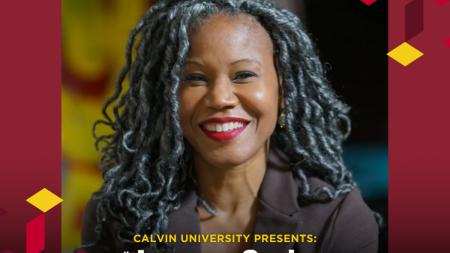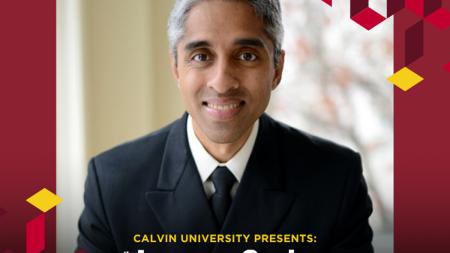Dealing with Death and Dying

Dr. J. Todd Billings, the Gordon H. Girod Research Chair of Reformed Theology at Western Theological Seminary in Holland, Mich., spoke about his latest book in a recent Church Now Conversation presented by Vibrant Congregations and supported by a range of ministry organizations. In the book The End of the Christian Life, Billings urges Christians to embrace their mortality in their daily life and faith. This is the journey of genuine discipleship, following the crucified and resurrected Lord in a world of distractions and false hopes, says Billings, who himself is living with incurable cancer.
In this conversation adapted for CRC News, Billings reflects on living in hard places and how we can learn important lessons there about God and full life.
Q: Along with having to deal with terminal cancer, what experiences inspired you to research and write about death and dying?
A: Again and again, I realized that many of my seminary students had never been to a funeral or had been to only one or two funerals in their lives before attending seminary – but then later in ministry work they were presiding at funerals, giving advice to families facing death and dying. And along with that I had an interest in how a congregation today can cultivate resurrection hope in a context where dying has become a medical experience, where instead of having the pastor by the bedside, it's the doctor by the bedside. And for families, instead of having an opportunity to share with one another, to confess sins and pray together, there’s often one question after another like “Do you want this extreme measure, or do you want something else done?
Q: So how did this emphasis on doctors’ stepping in to handle tough, end-of-life questions lead you to consider the role of the church?
A: I found that ultimately what the church needed wasn't just something to think about the very end of the Christian life. The church also needed to consider how mortality is tied into the whole approach to discipleship. You can't coherently tell a person this one story about what it means to be a follower of Jesus when they are six, and then when they are 20 and in college, and then when they are 50 – and then totally change it up when a doctor says they're in their last six months. Another dynamic that was a motivator was my own cancer. In my experience, I realized there's a need for starting over again. There’s a need to ask, “How do we think . . . through our future in relation to death and dying?”
Q: How are you doing now with your illness?
Thankfully, I’m able to work now again. I had a stem-cell transplant, and I have ongoing chemotherapy. At the same time, I found myself immersed in a community, a cancer-patient community, where there was a lot of death – for example, the death of my six-year-old neighbor from cancer. And there was death happening to people my age, and to people in their seventies and eighties. And I realized that so much of the culture in which I had been trained in my first 39 years, before my diagnosis, was actually a set of strategies to keep death at the sidelines.
Q: Can you talk more of how your cancer has made you reflect on death in a different way?
A: I no longer assume that death is something that happens to other people. . . . And I realize how deeply different this is from the Christian story and how deeply different it is from Christians historically, how they have approached their own lives. For example, there was Benedict of Nursia, who developed the Benedictine rule that many Catholics and some Anglicans to this day use in monasteries.
Q: How did Benedict suggest we approach death?
A: One of the rules he followed – and had others do as well – was to think daily of your own death and to hope, as you do this, to long more fervently for eternal life. There also was Jonathan Edwards, who also made it a practice to think daily of his own death. There's a whole Puritan tradition along this line. And I found that in the modern faith context, not only is that not cultivated, but it is seen as counter to following Jesus. It's seen as not focusing on the positive, or on the potential, as in changing the world, and so on
. . . . So in some ways, a key starting point of my book and the process is just to ask a question that comes from reading the Psalms.
Q: And what is that question?
A: That question is “What does it mean to live as a small, mortal creature before the everlasting Lord?” For example, in the words of Psalm 103, “As for mortals, their days are like grass; they flourish like a flower of the field; for the wind passes over it, and it is gone, and its place knows it no more. But the steadfast love of the Lord is from everlasting to everlasting on those who fear him” [vv. 15-17].
Q: In your book, you write about the rich heritage of the Psalms and other Scriptures and what they have to teach us about death and God’s providence.
A: Yes. Passage after passage is . . . connected to being dust and returning to dust. And also we have the prophets, who contrast the eternal word and life of the living Lord to our small, short lives. The psalms bring these things before God – as in Psalm 39: “Lord, let me know my end, and what is the measure of my days; let me know how fleeting my life is. You have made my days a few handbreadths, and my lifetime is as nothing in your sight” [vv. 4-5].
Q: Seems like we can take that passage in two ways. It might be pretty depressing or lift us up.
A: Sometimes we might use this in a way to motivate us to be more efficient with our time. And that's kind of the opposite of what I'm saying, because as you dig deeper into those passages, the key aspect is the contrast with the everlasting Lord, speaking about how the creatures of the earth will perish, but you believe you will endure. And so what I've been exploring in this book is the reality that only those who know that they are dying, who know that they are mortal creatures, can properly trust in God's promise for eternal life. Now, that may sound morbid, but it's actually not morbid at all. And that is something that I've had many readers tell me – this is not a morbid book.
Q: Does it take a leap for some readers to see this in a positive way?
A: It does involve looking openly and with awareness at a wound – perhaps it's a wound of someone who has died, who's been close to you, or of a terminal diagnosis, or perhaps of living through the ache and ambiguity of a pandemic. And the life that we thought we had has been punctured. It's our instinct, I think, to want to cover over that wound and to try to live like things were before, to sort of sanitize our reflections so that death is something that happens only to other people. But, for Christians, there's something strange and beautiful. And that is that coming to terms with this wound is actually a pathway to teach us how to live and hope as creatures longing for the deliverance that Jesus and the triune God will bring. One way to say it would be “Only the captives seek deliverance, only the wounded long for their cuts to be mended.”
Q: Can’t facing our wounds, especially the deepest ones, take us into some dark places? In your book you talk about being in a pit. What is this?
A: When someone is in the pit, which in the Bible is often called Sheol, the place of the dead -- what the soul must cry out for is not just deliverance. As the psalmist often says, “My soul longs . . . for the temple of the Lord.” When Jonah is stuck in the belly of a fish, he doesn't just say, “Spit me out.” He describes this place of being in darkness as Sheol. And then he says, “I long for one thing: the holy temple.” Well, what is the holy temple? The temple is the dwelling place of the Lord of the universe. Creation itself, as we know from Genesis, was created to be a dwelling place for the Lord – a temple in that sense. There's temple imagery throughout the opening few chapters of Genesis. And then when the Lord gives commands for the tabernacle and the temple at Sinai, it's this gracious way of being, giving a place of presence, of dwelling, even amidst the sinfulness of his people.
Q: Tell us more about the importance of the pit.
A: The thing about this is that if you are in Sheol (the pit), and you're crying out to go to the temple, you're not just trying to get out and be free so that you can live your own life and do your own thing. With the temple comes the law . . . the need for sacrifice. . . . So when Jonah is crying out to go to the temple, that's a dangerous place to cry out to go. And yet, as we join the psalmist in prayer and admit that we are stuck, we realize we can't deliver ourselves. Whether this Sheol is a place of abandonment from God, whether it is an illness, whether it is the wound of a lost one, whether it is an addiction – abandonment can take many, many forms. And the key aspect of it is just this sense that the psalmist has – that the light is far away, so the psalmist says, “Lord deliver me; do not hide your face from me; bring me into your light, into your presence.”
Q: So out of the darkness of the pit, we can find the light? We can find deliverance?
A: In the book, I explore how in the person of Jesus, the temple is personified, the Word tabernacles among us. . . . Jesus goes as a pioneer and meets us in the pit. Recall how Jesus said on the cross: “My God, my God, why have you forsaken me?” And the Heidelberg Catechism has an extraordinary passage on this, assuring us that when we experience anguish and even hellish dread that we are not alone, that Jesus has gone before us in our humanity. And yet this same one is our deliverer, the one who provides a sacrifice that we could not make on our own, and provides the new life that we could not make on our own.
Q: So dwelling in the temple – connecting in our suffering with Christ – is what is important?
A: I think that in some ways, when we move from the pit to the temple – and the temple in Jesus – and we start to locate our hope there, it changes all sorts of things. And it unveils a lot of our idolatries. So when we pray for someone for healing, I’ve come to pray, to really think in terms of the temple and the presence of the Lord, to pray that, through the Holy Spirit, Jesus will be present with them because in God is life – and not just biological life. When we pray for someone for healing, it shouldn't just be about fixing this particular wound so that they can go off and live their own way. No, we pray for them and seek to both receive the gifts they have for us and give to them in such a way that they can follow more deeply and bear witness to the crucified and risen Lord.
Q: At the end of your book you have a chapter on the prosperity gospel. Can you talk about that and how it applies to you?
A: I didn't plan to have a chapter on that when I started. . . . But I found that it is much, much more widespread than I had realized. I grew up in a context where there was Jimmy Bakker, who was always on television and was asking for money and saying God wants you to be rich. And then there was a scandal about how he was using the money for himself and so forth. I was very cynical about the prosperity gospel and thought, “Oh, that's something over there, something that could never apply to me.” But in my case, receiving a cancer diagnosis and undergoing treatment for an incurable cancer, I found myself coming to the Lord and assuming that God owed me a long life, that God owed me a chance to live long enough to see my kids graduate from high school and to meet my grandchildren. And yet the Lord never promises that. Abundant life that the Lord promises is not measured in years. The psalms that say our lives are like a breath apply just as much to the child who lives only one day as to someone who lives to be a hundred. Life is so short in relation to the everlasting God. It is a gift – every breath.
And so I realized that in a sense I . . . and many of us have started to use the Christian faith as something useful for our own purposes to help us lead a long middle-class life that we think we deserve. But that is different from the astonishing and much better promises that we receive through Scripture. And so my book seeks to get at the way in which the end, the purpose, of the Christian life and of discipleship involves embracing our smallness, embracing the fact that we are not central in the story.
Q: But we do have a place – a small place, to be sure – in the story?
A: We have a place as ones who have been united to Jesus by the Spirit and have been baptized into him. And in our living we share in his dying and rising again. We anticipate that. We feast together at the table. We long for him to come again and set things right. But this involves being called into a life that is quite different from the life that we often want to speak about, even in the church – a life where we have economic security, and we live a long life, and we don't have these pesky wounds that we want to make go away.
For more on this conversation and other talks in the Church Now Conversations series, visit vibrantcongregations.org/church-now.


